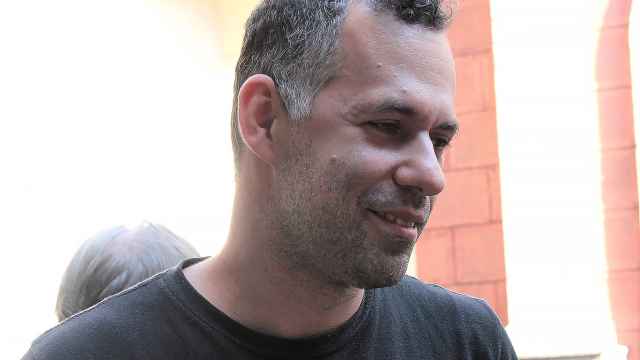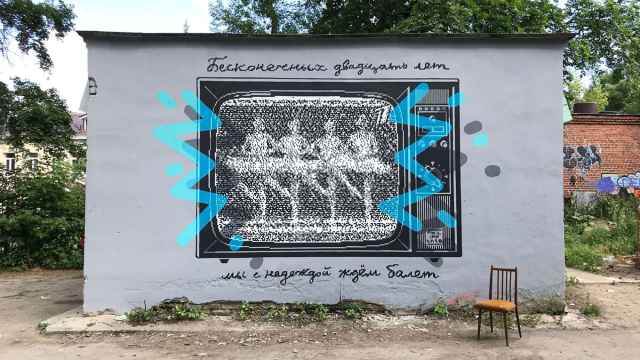But I attended an evening honoring the memory of director Boris Lvov-Anokhin on Friday that was different. Enough so, in any case, that I found it to be a small revelation.
I should state immediately that I was there because of my wife Oksana Mysina, who performed in Lvov-Anokhin's last four productions before his death in 2000. Oksana's deep connection to Lvov-Anokhin is, in many ways, my own. Two of his portraits hang over Oksana's vanity table, which I pass 47 times a day. A landscape that hung in his house now hangs in our entryway, bequeathed to Oksana following his death. A photo of him even stands on my mother's television set in California — that is how far his influence has reached into my family. Rarely does a day pass without Oksana remembering her love and respect for this director who helped her create four of her favorite roles.
In short, if you wish to call me prejudiced, go right ahead.
I always thought I knew a lot about Lvov-Anokhin. I knew he debuted in the 1950s, having several hits at the Soviet Army Theater. I knew he took over the Stanislavsky Theater in the early 60s where he had several more hit productions before he was forced to resign in 1969 under cloudy circumstances. He more or less disappeared in the middle of the 1970s before coming back with several major successes at the Maly Theater at the end of the decade. But the Maly fired him in 1989, prompting several actors to quit the theater in protest, and he took over a little-known house called the Novy, or New, Theater where he remained until his death at the age of 74.
That's the timeline and it says virtually nothing.
Of course I had seen through the general façade. I interviewed him several times, the first being in 1993, when he pulled back a curtain on what happened to him in the 1970s. Admitting to revealing this for the first time ever in an interview, he explained that the government began attacking him for an unhealthy interest in foreign existential literature. He made history with a smash production of Jean Anouilh's "Antigone" in 1966 and he also staged the writer's "Medea." He announced further plans to stage Anouilh's "Eurydice" when he was called in by the authorities.
"They said, 'Your theater is named for Stanislavsky, nor for Anouilh. And you are not going to stage any more Anouilh!''' the director told me. When Lvov-Anokhin questioned their logic, stating that the great Alexander Tairov had staged Eugene O'Neill three times in the 1920s, he was told, "That's right, and there is no Tairov theater any more either."
After being forced out of the Stanislavsky, Lvov-Anokhin was plunged into depression and spent much of the middle part of the 1970s in hospitals. A nurse one day whispered to him that her superior had given orders to find reasons to declare Lvov-Anokhin psychologically unsound in order to have him committed to an insane asylum.
One speaker at the Actors House on Friday recalled running into Lvov-Anokhin on the street during this period and not recognizing him. The always forceful, upbeat, witty director was pale and defeated. "This is how they went about breaking people in those days," the speaker declared.
I mention this now for the sake of historical accuracy and for contrast. The highlights of Lvov-Anokhin's career tell another story entirely.
He debuted as a director at the Soviet Army Theater in 1955. His third production, a small-stage affair that promised little before it opened in 1957, was a huge success that served to discover one of the great playwrights of the late Soviet period.
Alexander Volodin is now recognized as one of Russia's finest playwrights. When Lvov-Anokhin staged his first play "Factory Girl" in 1957, both the writer and the director were virtually unknown. Within weeks, that changed. Partially driven by the play's political daring and the huge backlash that engendered in the press, the theater quickly found itself selling out every performance of the play.
Boris Poyurovsky, hosting the evening at the Actors House, gave a concise explanation of that for those who didn't know — in the Soviet period the best review a show could get was a slam in the official newspapers Izvestia or Pravda. The more the Party-line papers railed at a show, the more audiences suspected there was something of interest going on.
During his tenure at the Soviet Army Theater in the 1950s Lvov-Anokhin went on to discover numerous plays by young writers, including Leonid Zorin, Mikhail Shatrov and Ion Drutse. He also brought to the stage neglected or unknown works by older writers that had never been produced in the Soviet Union, such as plays by the Turkish poet and playwright Nazim Hikmet, George Bernard Shaw and Karel Capek.
Lvov-Anokhin's work with these writers marks him as one of the most important figures in the renewal of theater that occurred in the immediate post-Stalin era known as The Thaw. It is no coincidence that Oleg Yefremov enlisted his services when opening what became the most important new theater of The Thaw era — the Sovremennik. Lvov-Anokhin was there from the beginning as a consulting friend and also as a director — he staged Volodin's "The Elder Sister" at the Sovremennik in 1962.
Poyurovsky pointed out that if Lvov-Anokhin had never done anything but stage "Antigone" in 1966, his place in history would be secure. In this show the director helped reinvent one of Russia's most beloved comic actors, Yevgeny Leonov, by casting him in the tragic role of Creon. According to legend, no one expected Leonov to succeed, but when he did his reputation as an actor changed forever. No longer was he a popular comic — he was one of the Soviet Union's finest actors, period.
A similar story of discovery and renewal occurred in 1978 when Lvov-Anokhin was invited in to talk by veteran actress Yelena Gogoleva at the Maly Theater. As the director told it himself during a television interview in 1996, she immediately said, "I know you don't like me as an actress, but I would like to work with you and I am willing to become your pupil if you would stage something with me." Lvov-Anokhin admitted he was not a fan of her work, but said he was impressed by her sincerity and her ability to be self-critical.
Thus arose one of the finest productions at the Maly in the 1970s — Jean Sarment's "Mamouret," in which, at the age of 78, Gogoleva played a feisty old woman of 106 and found a whole new audience and career. That success was repeated in 1987 with Gogoleva in the revival of another obscure play, Pyotr Gnedich's "Lackeys," after which critics and the public began talking of Gogoleva as one of Russia's "great actresses."
Still another of Russia's most beloved actresses worked with him on a production of Nikolai Leskov's "The Warrior Woman" in 1988 at the Satire Theater. And again a familiar pattern emerged. Known as an actress of great charm and warmth, Vasilyeva was generally considered utterly wrong for the part of Leskov's tale about a lonely, aging woman who trusts no one. Speaking on Friday, Vasilyeva confirmed that notion herself, admitting she didn't see herself in the role at all when Lvov-Anokhin offered it to her. She did, however, trust his instincts and accepted his invitation to play the part. It became one of the most memorable of her career.
As the evening honoring Lvov-Anokhin wore on, a picture took shape of a quiet, but protean figure who had a knack for discovering talent and breathing new life into talent that needed renewal. It is a remarkable picture.
It becomes even more remarkable when you consider the fact that Lvov-Anokhin conducted a parallel career as one of the most respected and influential ballet critics in Russia in the second half of the 20th century. His writings about the great dancers Galina Ulanova, Maya Plisetskaya and Vladimir Vasilyev are considered unsurpassed. Over 100,000 copies of his books about Ulanova were published in his lifetime. He wrote the libretto for Rodion Shchedrin's ballet "Anna Karenina," danced and choreographed by Plisetskaya at the Bolshoi Theater in 1971.
In his later years, when I knew him thanks to Oksana, Lvov-Anokhin was regarded as an aesthete's aesthete. Theater at that time was struggling to find a new path, often in ways that challenged critics and audiences with harsh topics and language. Lvov-Anokhin was dead set against that. As he told me in 1993, "I want theater to be festive and romantic."
That brought him detractors in the last years of his life, but it also gathered around him a fiercely loyal fan base. The fact of the matter is that this artist was too big to fit neatly into any one era or style. His contribution to the second half-century of theater in Russia was enormous, as I was reminded again last week at the Actors House.
A Message from The Moscow Times:
Dear readers,
We are facing unprecedented challenges. Russia's Prosecutor General's Office has designated The Moscow Times as an "undesirable" organization, criminalizing our work and putting our staff at risk of prosecution. This follows our earlier unjust labeling as a "foreign agent."
These actions are direct attempts to silence independent journalism in Russia. The authorities claim our work "discredits the decisions of the Russian leadership." We see things differently: we strive to provide accurate, unbiased reporting on Russia.
We, the journalists of The Moscow Times, refuse to be silenced. But to continue our work, we need your help.
Your support, no matter how small, makes a world of difference. If you can, please support us monthly starting from just $2. It's quick to set up, and every contribution makes a significant impact.
By supporting The Moscow Times, you're defending open, independent journalism in the face of repression. Thank you for standing with us.
Remind me later.






